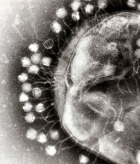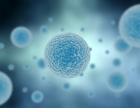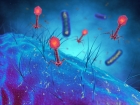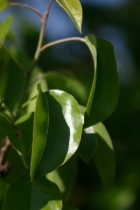Press monitoring
Tackling antibiotic resistance: Phage-mimicking antibacterial core-shell nanoparticles could help
24.1.2020 | Press monitoring
According to the World Health Organization, one of the biggest health threats around the world is antibiotic-resistant bacteria. Researchers at the University of Notre Dame are working to combat this problem by looking to bacteriophages or phages. In a study published in Nanoscale Advances, the researchers have shown the efficacy of a new...
Peptide tooth coating helps keep cavities at bay
22.1.2020 | Press monitoring
Tooth enamel is one of the few tissues in the body that doesn’t repair itself, which is why cavities are such a common health problem. Fillings are essentially the only treatment option widely available at the moment, but now researchers from China have created a new peptide-based coating that can prevent cavities from forming. Human saliva is a...
Chemists find fungal shrapnel in the air
20.1.2020 | Press monitoring
In a discovery that has implications for our understanding of the air we breathe, UCI chemists report that they've found nanoscale fragments of fungal cells in the atmosphere. The pieces are extremely small, measuring about 30 nanometers in diameter, and much more abundant than previously thought. "These fragments are most likely bits of fungal...
Solid cryogel vaccine cures and protects against blood cancer in mice
17.1.2020 | Press monitoring
For today’s sufferers of the blood cancer acute myeloid leukemia (AML), standard chemotherapy remains the most common course of treatment, but the risk of recurrence is high and occurs in almost half of patients. In search of therapies that can offer longer-term protection, scientists at Harvard University have developed a new type of vaccine...
Moon shrooms? Fungi eyed to help build lunar bases and Mars outposts
15.1.2020 | Press monitoring
Fungus could be very much among us when humanity sets up shop on the moon and beyond. NASA researchers are investigating the potential of mycelia – the mass of nutrient-absorbing, widely branching underground threads that make up much of a fungus's bulk – to help construct outposts on the moon and Mars. "Right now, traditional habitat designs...
Taking one for the team: How bacteria self-destruct to fight viral infections
13.1.2020 | Press monitoring
Researchers at University of California San Diego School of Medicine have discovered how a new immune system works to protect bacteria from bacteriophages (phages), viruses that specifically infect bacteria. This new system is unusual in that it works by abortive infection – the infected bacterial cell self-destructs to keep the infection from...
Insulin made from egg yolk promises cheaper treatment for diabetics
10.1.2020 | Press monitoring
The insulin pumps diabetics currently rely on do a great job of delivering the hormone as needed, but need regular replacing due to what are known as fibrils. These form over a day or two as insulin compounds accumulate into clumps and create the risk of blockages, but scientists in Australia have engineered what they say is a safer alternative,...
Immunotherapy supercharges metal nanoparticles to destroy cancer cells
8.1.2020 | Press monitoring
An international team of cancer researchers has developed a new type of copper-based nanoparticle that can kill tumor cells in mice. While the technology showed effectiveness on its own, by combining it with immunotherapy the scientists say it produced long-lasting effects, quickly killing off any cancer cells that dared to return. The therapy...
Poplars genetically modified not to harm air quality grow as well as non-modified trees
6.1.2020 | Press monitoring
Field trials in the Northwest and Southwest show that poplar trees can be genetically modified to reduce negative impacts on air quality while leaving their growth potential virtually unchanged, says an Oregon State University researcher who collaborated on the study. The findings, published today in the Proceedings of the National Academy of...
Supercharged immune cells shrink tumours with RNA vaccines help
3.1.2020 | Press monitoring
Vaccine drives growth of T cells engineered to attack cancer cells, according to experiments in mice. People with several types of blood cancer have reaped enormous benefits – including long-term remission – from treatment with CAR-T cells, immune cells modified to fight malignant invaders. But technical hurdles have limited these cells’...






























